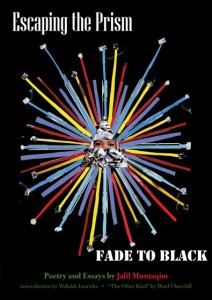Escaping the Prism – Fade into Black, by Jalil Muntaqim: Book Review by Phyllis Taub Greenleaf
 This book is a powerful tapestry of Scholarship, Activism and Poetry. The Personal with the Political gives this book balance and magnetism!
This book is a powerful tapestry of Scholarship, Activism and Poetry. The Personal with the Political gives this book balance and magnetism!
During the time when key leaders of the Black Panther Party were assassinated by FBI operatives while asleep in their beds, Jalil Muntaqim, a new member of the BPP, was arrested just before his 20th birthday.
Incarcerated in California and New York for the past 47 years, Muntaqim’s essays and poetry in ESCAPING THE PRISM are a living testimony to one man’s creativity, resilience and commitment to justice for himself, and all political prisoners in our “so called” Democracy.
His poetry sings out his honesty:
My poetry replaces hate with understanding…
My poetry…is a rebuke of the ostrich syndrome—
a swift kick in the ass to make you stand up straight and take responsibility…
demanding you to live life fully and love completely….
My poetry only asks for your ear to open your mind
so your heart will hear my poetry tantalizing your soul….
My poetry…is my life.
His prose demands our attention: “It is imperative [that we] come to terms with the reality that America [houses] the prison industrial complex, and that the silence and inaction of Americans is complicit in maintaining a system that in its very nature is inhumane.”
Some of his poems are painfully personal, such as this one to his daughter Zakia, who was in her mother’s womb when Jalil was first incarcerated:
I call you when my days are in gloom,
I call you when my nights are void of the moon.
I call you when my soul is in despair,
and the only solace I can find is knowing you are there.
I call you LOVE because you represent my own heart, blood, and soul.
His essays invite us—demand us—to act, by giving the reader economic facts that support his and other scholars’ conclusion that the Prison Industrial Complex (PIC) is a big and profitable business in our nation. He shows us in detail how the Corrections Corporation of America (CCA), owner of most US private profit-making prisons, sells shares on the New York Stock Exchange, and therefore “benefits financially from harsh criminal justice polices.” In other words, more humane policies toward non-violent prisoners, which include recent immigrants, would cut into the profits of the PIC. Therefore, the CCA is about corporate profit not public safety or rehabilitation.
Jalil’s scholarship translates into his activist call to us on the outside to publicly demand divestment from corporations who financially benefit from inhuman prison policies—i.e., solitary confinement torture.
Just as activists worldwide joined the divestment campaign to end South African Apartheid policies, Jalil is calling us to vocally participate in the PIC divestment movement: “In essence, the challenge is to take the profits out of the prison system. A divestment movement of the PIC addresses the issue of mass incarceration in pragmatic terms, changing the paradigm of incarceration as a public safety issue, when it is actually a profit-motivated institution.”
Jalil’s visionary activism describes public safety as “citizens patrolling their own communities…after school programs and community centers…better educational facilities…housing the homeless…employment at living wages.”
“CHANGING THE PARADIGM OF PUBLIC SAFETY REMOVES THE DEMAND FOR REPRESSIVE LAW ENFORCEMENT AND A RACIST JUDICIAL SYSTEM.”
As an educator/activist, I support Jalil’s invitation to participate in this national divestment movement “to take the profit out of prisons.”
The poems following this activist invitation are filled with the personal horrors as experienced by prisoners “held in cubicle chambers…the decay of dreams deferred…like the full bowels of slave ships…a spirit’s horror of lost freedom.”
In his chapter, “When Food Becomes a Weapon,” Jalil validates the Pelican Bay PRISON HUNGER STRIKERS of California, whose anti-racist and nutritional demands got public attention and support.
You feel righteous indignation in his writings, as well as his love for Freedom and the Beloved Community that he has dedicated his life to.
His essay dedicated to “Mothers who have lost a child from an unjustified police shooting” is a powerful indictment of law enforcement in our country. It sheds light on “the presumption of immunity” for police, and decries the militarization of our policing institutions, clearly supporting the growing Black Lives Matter Movement in our nation.
Some of his poetry is intimate and personal about women he loves deeply. His descriptions of their sexual pleasures are beautiful to read.
The depth and breadth of Jalil’s book demonstrates his brilliance, his lived experiences, his personal, historical, social, emotional and political understanding of the decades of oppressive and racist behaviors of the mainly white men in certain positions of political power.
He exposes policies that have destroyed the lives of thousands of our fellow citizens—especially low income people of color.
As a lifelong educator/activist myself, I hope that this book can become required reading in high schools, community colleges and universities, especially in interdisciplinary courses that address psychological, sociological, historical and political issues pertaining to family and community, law and order, democracy and freedom.
As our nation continues to grapple with racism and inequality still, this REMARKABLE collection is truly a testament to the vision and integrity of Jalil Muntaqim—a dedicated scholar, unrelenting activist, and fearless freedom fighter.
Book Review by Phyllis Taub Greenleaf, M.Ed, Harvard School of Education. 1969. Lifelong activist and former community college teacher of child development.
Escaping the Prism Fade to Black is published by Kersplebedeb Publishing; to order your copy, visit leftwingbooks.net or AK Press or Amazon.
Leave a Reply